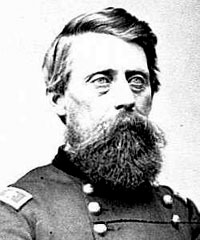Jefferson Columbus Davis (1828-1879)
Jefferson Columbus Davis (March 2, 1828 - November 30, 1879) was an officer in the United States Army during the Mexican War, the Civil War and the Modoc War. He was also the first commander of the Department of Alaska from 1867 to 1870. He served the office with the rank of Brevet Major General of the United States Army.
 Born on a farm near Memphis in Clark County, Indiana, on March 2, 1828, Davis enlisted in 1846 in the 3rd Indiana Infantry and served in the Mexican War. Upon completion of volunteer service, at the age of 20, he was given a direct commission as a second lieutenant in the regular army and was promoted to first lieutenant four years later.
Born on a farm near Memphis in Clark County, Indiana, on March 2, 1828, Davis enlisted in 1846 in the 3rd Indiana Infantry and served in the Mexican War. Upon completion of volunteer service, at the age of 20, he was given a direct commission as a second lieutenant in the regular army and was promoted to first lieutenant four years later.
He distinguished himself at the Battle of Buena Vista and was given a direct commission to Second Lieutenant. He remained in the army after the war, and in April 1861 was stationed at Fort Sumter guarding the harbor at Charleston, SC. After the bombardment and surrender of the fort to South Carolina troops, Davis received a volunteer commission to Colonel and given command of the 22nd Indiana Infantry in August 1861, with which he served in the Battle of Wilson's Creek.
In December 1861, he became Brigadier General of Volunteers commanding the Third Division, Army of the Southwest at the Battle of Pea Ridge. He commanded the Fourth Division, Army of the Mississippi at Corinth. He went on sick leave, but left his hospital bed to serve in the defenses of Cincinatti.Davis was promoted to Brigadier General for his actions at Pea Ridge and was transferred to the Army of the Cumberland. There, he became one of the Union Army's most controversial generals. On September 29, 1862, Davis and his commander, General William Nelson, got into an heated argument in the middle of the lobby of the Galt House hotel in Louisville. Nelson cursed and swore at Davis, and Indiana's governor Oliver Morton, who was also present. Finally, Nelson slapped Davis twice. Davis left the hotel, took a pistol from another officer, returned and shot Nelson in the heart. Davis was arrested and imprisoned but General Horatio G. Wright came to his aid and was able get him released from prison. Davis was never prosecuted for the murder of Nelson, most likely due to political influence from Governor Morton, and was quickly restored to duty because there was a need for experienced field commanders in the Union Army.
He commanded the 1st Division, Right Wing at Stone's River which became the 1st Division, XX Corps at the Battle of Chickamauga.
He commanded the 2nd Division, XIV Corps at the battle of Chattanooga and during the Atlanta Campaign.
He took command of the XIV Corps and led it during the March to the Sea and the Carolinas campaign. By the end of the war, he had risen to the rank of Major General and was one of General ShermanŐs most capable and trusted commanders.
He was a capable commander but due to the murder of General Nelson, Davis never received a full promotion higher than brigadier general of volunteers. He did however receive a brevet promotion to major general of volunteers on August 8, 1864 and a brevet promotion to brigadier general in the regular army on March 13, 1865.
After the American Civil War, Davis continued service with the Army. He was the military commander in Alaska (1867-70) and fought in the west against the Modoc Indians in retribution for their murder of Gen. Edward Richard Sprigg Canby.
Davis died on November 30, 1879, in Chicago and was buried in Crown Hill Cemetery in Indianapolis.
 Born on a farm near Memphis in Clark County, Indiana, on March 2, 1828, Davis enlisted in 1846 in the 3rd Indiana Infantry and served in the Mexican War. Upon completion of volunteer service, at the age of 20, he was given a direct commission as a second lieutenant in the regular army and was promoted to first lieutenant four years later.
Born on a farm near Memphis in Clark County, Indiana, on March 2, 1828, Davis enlisted in 1846 in the 3rd Indiana Infantry and served in the Mexican War. Upon completion of volunteer service, at the age of 20, he was given a direct commission as a second lieutenant in the regular army and was promoted to first lieutenant four years later.